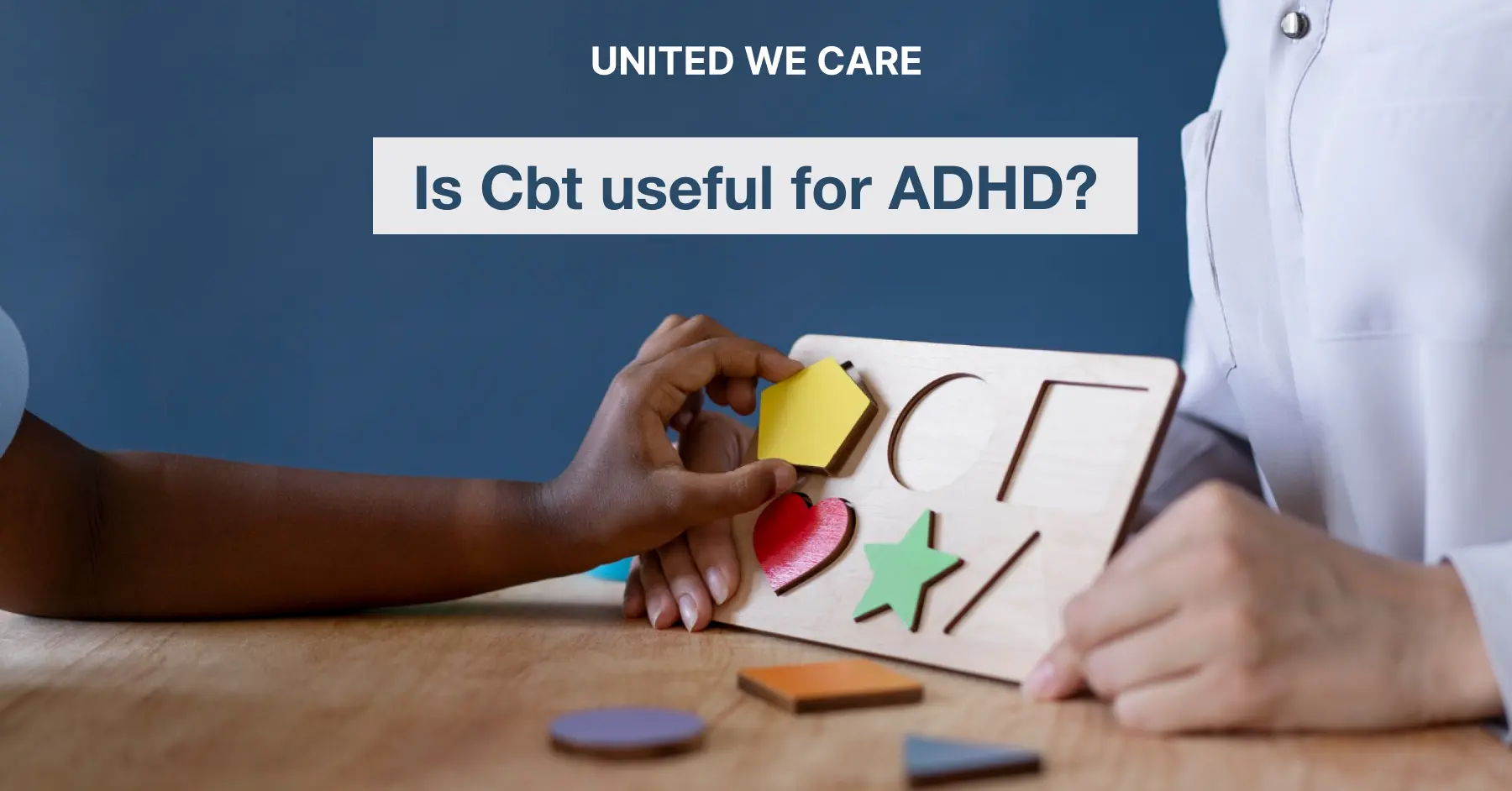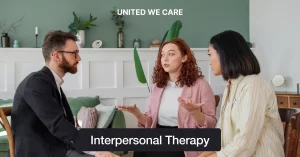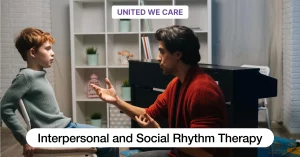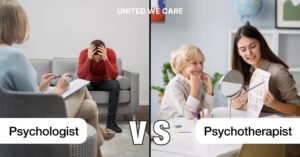Introduction
Over 7% of the population worldwide has attention deficit hyperactivity disorder (ADHD), which makes it one of the most common neurodevelopmental disorders.[1] While children are primarily affected by it, ADHD can last well into adulthood. The main symptoms of this disorder include not being able to focus, being hyperactive physically or mentally, and acting impulsively. Differences in the brain’s structure and functioning, genetics, and environmental factors can cause ADHD. A combination of therapy and medication can help manage ADHD effectively. Cognitive behavioral therapy (CBT) for ADHD is considered one of the most effective treatment options today.
In this blog, we’ll understand more about this neurodevelopmental disorder and its presentation in adults, how CBT can be adapted to treat ADHD, its effectiveness, and common CBT exercises for self-help.
CBT for ADHD
Cognitive behavioral therapy functions on the principle that beliefs and thoughts result in certain emotions, which result in the way we act and react, which further reinforces our beliefs. Hence, if we have a negative thought about ourselves, someone else, or a situation, it will only intensify through our emotions, leading to unfavorable behavior and outcomes.[2]
Through CBT for ADHD, you can learn to change these patterns of thought, hence changing the outcome to something more balanced and favorable for yourself.
How does CBT Work for ADHD?
If you have ADHD, it is likely that you struggle with structure and organization, goal setting, maintaining your focus, self-control, and procrastination. CBT can help you with:
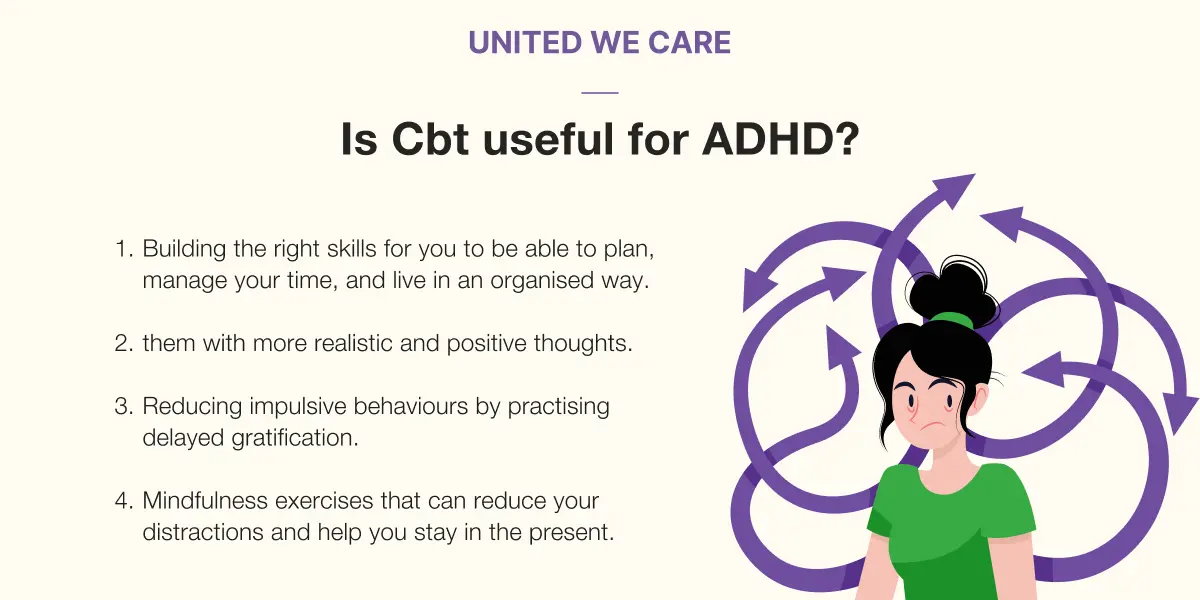
- Building the right skills for you to be able to plan, manage your time, and live in an organized way.
- Identify and challenge the thought patterns that are not serving you and replace them with more realistic and positive thoughts.
- Reducing impulsive behaviors by practicing delayed gratification.
- Mindfulness exercises that can reduce your distractions and help you stay in the present.
Is CBT Effective for ADHD?
Most recent studies have evaluated and deemed CBT to be effective in the treatment of ADHD:
A 2019 study in China explored the benefits of CBT for 124 adults with ADHD undergoing 12 weeks of group CBT. The results suggested that CBT is equally effective in treating core symptoms of ADHD, such as depression, anxiety, and executive and social functioning, whether administered with medications or not. [3]
A 2020 systematic review considered 53 studies on psychological treatments for adult ADHD. The review authors noted that CBT showed the strongest empirical support of all non-pharmacological interventions. Along with CBT, they also found mindfulness, dialectical behavior therapy (DBT), and neurofeedback to be effective. [4]
In a 2023 systematic search of 5000 studies on the efficacy of ADHD medication and behavioral therapy, researchers found that 10-30% of children and young people either do not respond to stimulant medication or experience side effects, and non-pharmacological interventions such as CBT are more acceptable due to lesser risk. [5]
CBT for ADHD Adults
The core symptoms of ADHD, namely inattention, hyperactivity, or impulsivity, manifest differently in children and adults. Children with ADHD may mainly struggle academically, understanding social norms and structured settings, and making friends. However, adults with ADHD may experience challenges in the way they perceive and manage themselves, at work, and in their interpersonal relationships. [6]
If you are an adult with ADHD, you may struggle with:
- Managing your time and organizing your tasks which affects your work
- Emotional regulation and communication, resulting in strained relationships
- Managing your finances, health, major life transitions as well as day-to-day responsibilities
- Feelings of low self-esteem and underachievement
You can apply various practical strategies based on CBT to deal with these struggles successfully, such as:
- Start breaking down your tasks into smaller, more manageable, and achievable goals. This can help you keep yourself motivated.
- Manage your time effectively by setting periodic alarms and reminders, as well as using techniques such as the Pomodoro technique to keep yourself on track. [7]
- Make it a practice to meditate or engage with your breath during your breaks or at any point in your day. This can help you be mindful of how you’re feeling.
- If you find yourself in loops of negative self-perceptions or distorted thinking, try challenging your negative thoughts by using a thought record worksheet. You can do this by looking for any evidence to support these thought patterns, and when you don’t find any, then replace these thoughts with more balanced and positive ones.
CBT for ADHD Worksheet
The Thought Record Worksheet created by the Beck Institute of Cognitive Behavioral Therapy is an effective tool to navigate through your ADHD challenges. Before beginning the exercise, it helps to be acquainted with the common cognitive distortions we usually face.[8] While using a thought record worksheet, you begin by identifying and noting down the situation, the emotion you’re feeling and the intensity you’re feeling it at on a scale of 0-10, and the automatic thoughts that are coming to your mind, which may be making you feel disturbed.
Following this, you look for evidence you think supports these thoughts. Once you have listed these, go on to find evidence that contradicts these thoughts and supports you instead. Then, using only the true evidence and an objective view of the situation, reframe your thoughts to a more balanced narrative that serves you.
Once you’ve replaced your automatic thoughts with balanced ones, reflect again on how you’re feeling now with the intensity of the emotion. Here’s an instance:
Situation: I did not finish an assignment on time.
Emotions: I feel frustrated (8) and anxious (6).
Automatic thoughts: I can’t do anything right, I am no good, I am always behind on finishing things.
Evidence supporting the thought: I missed the deadline, and I couldn’t focus when I was working on it.
Evidence against the thought: I did complete other assignments as required, and I was even appreciated for my work. This particular circumstance is an exception.
Reframed balanced thought: I may have struggled with managing my time this time, but I am usually able to keep myself on track and succeed. This one experience does not define me or my work; if anything, I can learn from it and improve.
Outcome: I still feel a little frustrated (3), but I do not feel anxious (0).
You can input the bold fields in an Excel sheet to make a DIY CBT for ADHD worksheet for yourself.
Conclusion
Cognitive behavioral therapy is very effective in managing ADHD. It is crucial to understand the principles and application of CBT from a trained psychotherapist so that you can practice CBT self-help exercises effectively.
Book a session with one of our mental health experts, who can help manage your ADHD with CBT. At United We Care, we offer the most appropriate, clinically backed solutions for all your needs for well-being.
References:
[1] R. Thomas, S. Sanders, J. Doust, E. Beller, and P. Glasziou, “Prevalence of Attention-Deficit/Hyperactivity Disorder: A Systematic Review and Meta-analysis,” Pediatrics, vol. 135, no. 4, pp. e994–e1001, Apr. 2015. [Online]. Available: https://doi.org/10.1542/peds.2014-3482. Accessed: Nov. 27, 2023.
[2] Steven C. Hayes, Stefan G. Hofmann, Process-Based CBT: The Science and Core Clinical Competencies of Cognitive Behavioural Therapy. [Online]. Available: https://books.google.co.in/books?id=J0tHDgAAQBAJ. Accessed: Nov. 27, 2023.
[3] M.-R. Pan et al., “A comparison of efficacy between cognitive behavioral therapy (CBT) and CBT combined with medication in adults with attention-deficit/hyperactivity disorder (ADHD),” Psychiatry Research, vol. 279, pp. 23–33, 2019. [Online]. Available: https://doi.org/10.1016/j.psychres.2019.06.040. Accessed: Nov. 27, 2023.
[4] T. Fullen, S.L. Jones, and L.M. Emerson et al., “Psychological Treatments in Adult ADHD: A Systematic Review,” J Psychopathol Behav Assess, vol. 42, pp. 500–518, 2020. [Online]. Available: https://doi.org/10.1007/s10862-020-09794-8. Accessed: Nov. 27, 2023.
[5] M. O. Ogundele and H. F. Ayyash, “ADHD in children and adolescents: Review of current practice of non-pharmacological and behavioral management,” AIMS public health, vol. 10, no. 1, pp. 35–51, 2023. [Online]. Available: https://doi.org/10.3934/publichealth.2023004. Accessed: Nov. 27, 2023.
[6] Paul H. Wender, ADHD: Attention-Deficit Hyperactivity Disorder in Children, Adolescents, and Adults. [Online]. Available: https://books.google.co.in/books?id=SMzhBwAAQBAJ. Accessed: Nov. 27, 2023.
[7] R.J. Dizon, H.D. Ermitanio, D.M. Estevez, J. Ferrer, S.J. Flores, K.M. Fontanilla, A. Frias, E. Galang, N.F. Guei, Dr. J. Sugay, “THE EFFECTS OF POMODORO TECHNIQUE ON ACADEMIC-RELATED TASKS, PROCRASTINATION BEHAVIOR, AND ACADEMIC MOTIVATION AMONG COLLEGE STUDENTS IN A MIXED ONLINE LEARNING ENVIRONMENT,” Journal of Progressive Education. [Online]. Available: https://globusedujournal.in/wp-content/uploads/2021/08/GE-JD21-Dr.-Sugay-J..pdf. Accessed: Nov. 27, 2023.
[8] Harvard Health Publishing, “How to recognise and tame your cognitive distortions,” Harvard Health Blog. [Online]. Available: https://www.health.harvard.edu/blog/how-to-recognize-and-tame-your-cognitive-distortions-202205042738. Accessed: Nov. 27, 2023.

